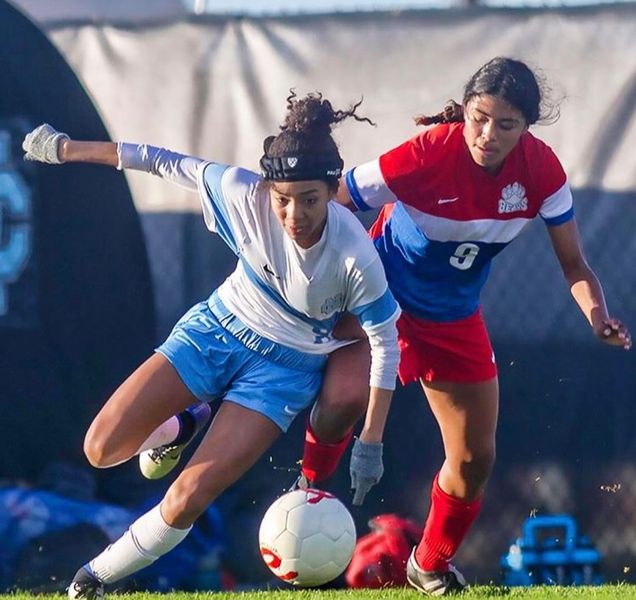
“I realized I’m not crazy for feeling depressed.”
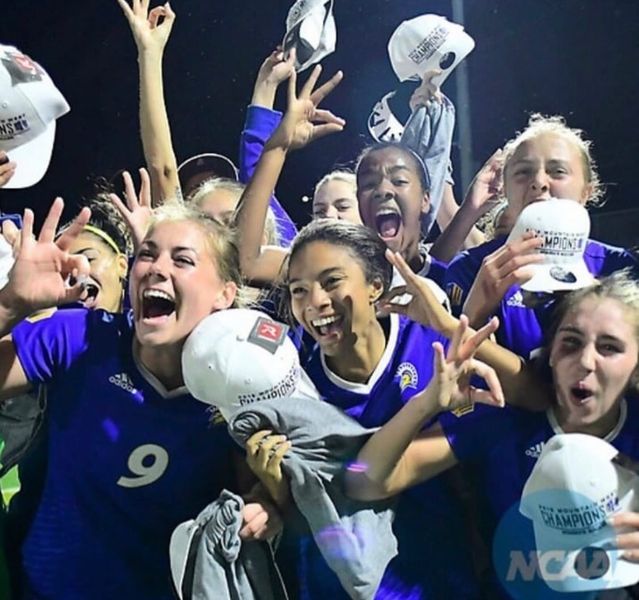
Photos Contributed by Hannah Hall.
————————
On a winter day in Fresno, CA, Hannah Hall laced up her soccer cleats and took the field with her seventh-grade teammates at Granite Ridge Intermediate. As usual, the 13-year-old girl was having fun on the field when her team matched up against another school. Like any other day, the rising star was running, kicking, competing fiercely and enjoying the game she loves.
Later in the game, Hall found herself in a one-on-one situation with the opposing goalkeeper. As she tried to dodge the keeper to score the goal, the teen collided with her opponent.
“The goalie took me out, hit my head on the ground,” Hall said. “I did not feel right after that first hit. I wanted to stay out of the game and then my coach put me back in.”
When she came back in the game, Hall ended up in another collision with an opponent and fell on the frigid ground.
“I got hit by a player and then that was the first hit there. And then the second hit was on the ground, hit my head and then someone stepped on the back of my neck,” Hall said.
When she was later taken to the hospital for evaluation, the young soccer star learned her diagnosis.
“That resulted in me being diagnosed with a mild concussion as they always do,” Hall said.
The severe effects of her injury, Hall said, became more obvious in the following weeks when she suddenly started struggling in school.
“Things were not clicking in the way they used to click and were not coming as easily as they used to before my concussion,” Hall said. “My mom was watching me read a textbook . . . and seeing me get frustrated because I was reading the same thing over and over.”
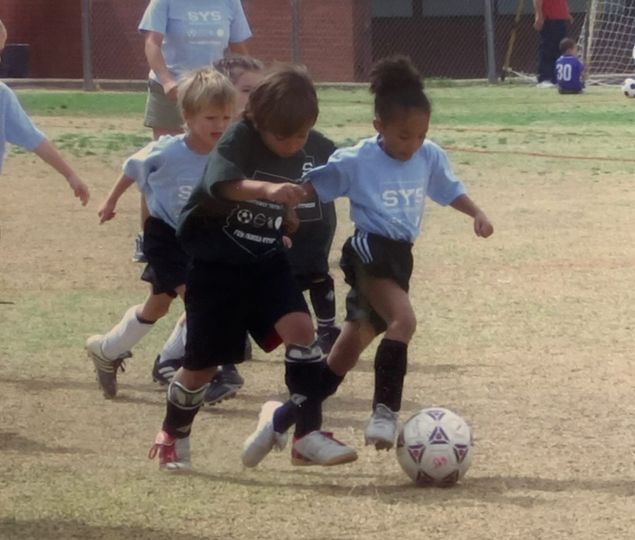
Still determined to excel in academics and sports, the Valley native continued her journey at Clovis North High School. Hall’s determination paid off in a big way in 2017 when she scored the game-winning penalty kick to seal the Central Section Division I title for the Broncos.
The Clovis standout started her next chapter at San Jose State, where she appeared in 17 games and earned four starts as a freshman defender for the Mountain West champs in 2018. Still, the pain of Hall’s brain injury continued to get stronger at San Jose State, causing physical and emotional pain. Eventually, Hall reached the point where she can no longer tolerate the pain and play the game she loves.
“I played Division 1 soccer until I medically retired in 2020, my junior year of college,” Hall said.
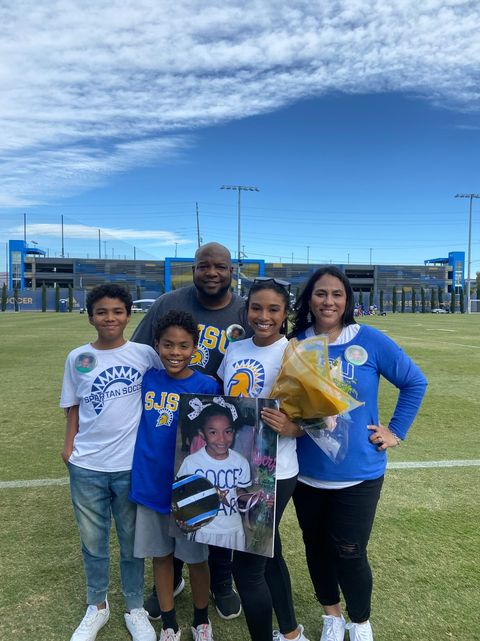
The former Spartan has now shifted her focus to helping other athletes who have similar stories as herself. Hall calls her initiative Head On.
“The point of Head On is to show others that there are other people just like you who are maybe struggling from the same effects,” Hall said. “As a result, we are creating a community where people can find resources or be mentored by one of our ambassadors. We have concussion support groups, we try to have them monthly . . . In these concussion support groups, I found other people who are having common issues, whether it’s difficulty driving, difficulty in school or socially they can’t focus the same way they did, so they’re having problems with their friend groups.”
Head On’s Instagram page now features resources, as well as dozens of stories from people who are battling the pain of a traumatic brain injury.
Hall is proud of the connections she’s making across the country because of her foundation.
“I got to connect with people from Rutgers University, Boise State University and create this ambassador program,” she said. “People who are really dedicated to Head On are on this team now.”
The Head On founder is leading her initiative while also focusing on her job as a membership engagement coordinator for the Seattle Mariners. This opportunity in baseball, she says, has saved her life.
“Just as much as I love to create goals and create possibilities on the field, I found that I was still able to use that passion that I have on the soccer field to create unforgettable experiences,” Hall said.
Hall arrived in Seattle after working as an intern with the Western Nebraska Pioneers, a summer league collegiate baseball team.
“In 2020 with the world shutting down and sports being on pause for a second, that forced me to look elsewhere for my passion. That’s when I found my first internship with the Western Nebraska pioneers,” Hall said. “Through them I really found my passion for creating events and creating opportunities for fans.”
The marketing pro wants her story to inspire others who are looking for the next opportunity after sports.
“For anybody who maybe struggling with finding what’s next after sports, there is so much more,” Hall said. “You can use your passion that you have in your sport and apply that to another part of your life.”
Hall is not just inspiring people around the nation. She also inspires her own family. That starts with her sister, Carys, a Division 1 soccer player at the University of Alabama.
“She had her own issues with her knee, problems with her ACL, so she definitely understands the impact it has to be sidelined, to not be on the field,” Hall said. “I think if there’s anything she learned from me, it’s that you just continue to be resilient. And sports aren’t everything, although it feels like the end of the world if you aren’t playing, there are other ways to find your passion.”
Looking back at the final moments of her soccer career in 2019, Hall said she remembers feeling vertigo, dizziness and new symptoms she wasn’t familiar with.
“And I think being away from home and not being with my neurologist, my primary care physician, it was very hard to navigate those symptoms in a collegiate space,” she said.
Baseball, however, helped Hall find her way back into sports.
“I medically retired once I realized that I can go on without playing on the field, but still be part of a sport outside of playing,” she said.
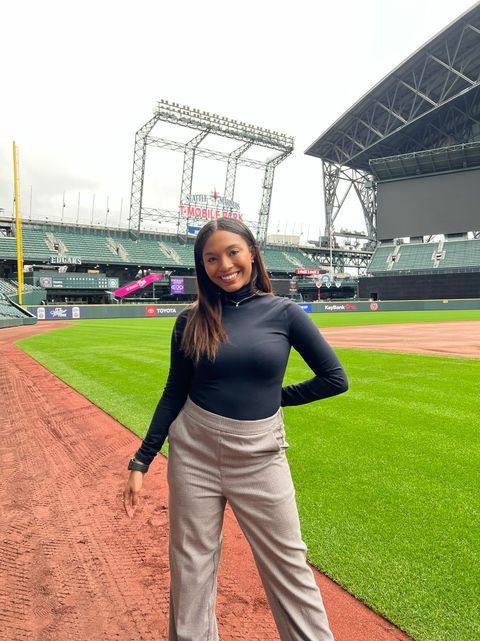
Hall’s passion, dedication and intelligence has always been obvious to many people who have seen her work in the classroom, on the soccer field or in her latest position in baseball. But what wasn’t obvious, Hall said, is the battle she was facing behind the scenes.
“On the outside, you see me thriving — in a Valley Championship here and there,” she said. “But you didn’t see that I was really struggling, trying to make my grades.”
When Hall went to see a neurologist after sustaining the injury, the doctors determined that her level of intelligence is extremely high, but she can “only remember and retain 3 percent of information given to her in a short term memory.”
“That’s why I was having so many issues academically,” Hall said.
As a result of the academic struggles caused by her injury, the Clovis student received extra assistance in school.
“I was on a 504 Plan in middle school. I would have so many days where I could not come to class because the headaches were too strong. I couldn’t focus,” she said. “That resumed all the way through high school, all the way through the college level as well. I ended up going on an IEP (Individual Education Plan). I really needed these academic supports. These are the things people couldn’t see from the outside.”
The physical pain, Hall said, was especially unbearable when she woke up in the morning after playing in a game a day earlier.
“I would not be able to go to school until like the fourth period because my head was hurting so bad from the night prior as a result of my concussion. This was just the new normal for me,” she said. “This is what I was dealing with. Lots of depression, anxiety, always feeling behind in school.”
When her struggles came to a boiling point at San Jose State, Hall said she “had a really bad mental breakdown.”
“I had a lot of troubling things happening at once. On top of that, I wasn’t able to play my sophomore year because of how bad my concussion symptoms were getting,” the former Spartan said.
For most student athletes, some of the best memories happen during the bus rides with teammates. For Hall, traveling by bus or plane to different cities made her pain much worse.
“My freshman year, we would go on a trip to a school like Boise State. And we would hop on a flight, but that flight would be so horrible on the way back,” Hall said.
With the pain of traveling proving to be unbearable, Hall struggled to enjoy some of the unforgettable moments she had on the field.
“I got an assist against Cal Poly, my first collegiate assist. I was so happy and it was just a moment that I really wanted to celebrate,” Hall said. “But that whole bus ride back from Cal Poly to San Jose was really difficult for me. I would find myself often in a dorm room, in a very quiet environment, in the dark, on the days after we would come back from our trips. Just not feeling well.”
Desperate for solutions, Hall started attending a mental health facility known as San Jose Behavioral Health.
“I was going there as if I was going to school, from 9 a.m. to 4 p.m. everyday,” she said.
As she connected with a support group at the facility and received assistance from therapists, Hall learned to look at her situation from a different perspective.
“Somebody told me, ‘nothing is wrong with you, you sustained a very traumatic brain injury and the chemicals in your brain are different.’ That hit home with me because I realized that it’s truly all because of that one night playing soccer at Granite Ridge. I realized that I’m not crazy for feeling depressed, I’m not crazy for feeling how I feel. It’s just what’s coming with it and I have to learn to adapt to my new situation.”
With that lesson in hand, Hall proceeded to create Head On.
“I created Head On because I have always felt very alone in my concussion recovery. I felt like nobody can understand me and what I’m going through,” the former Bronco said. “So Head On was created to give people a platform where they can share their own stories and see there are many people just like them who are going through the same issues. There is a community for you.”
